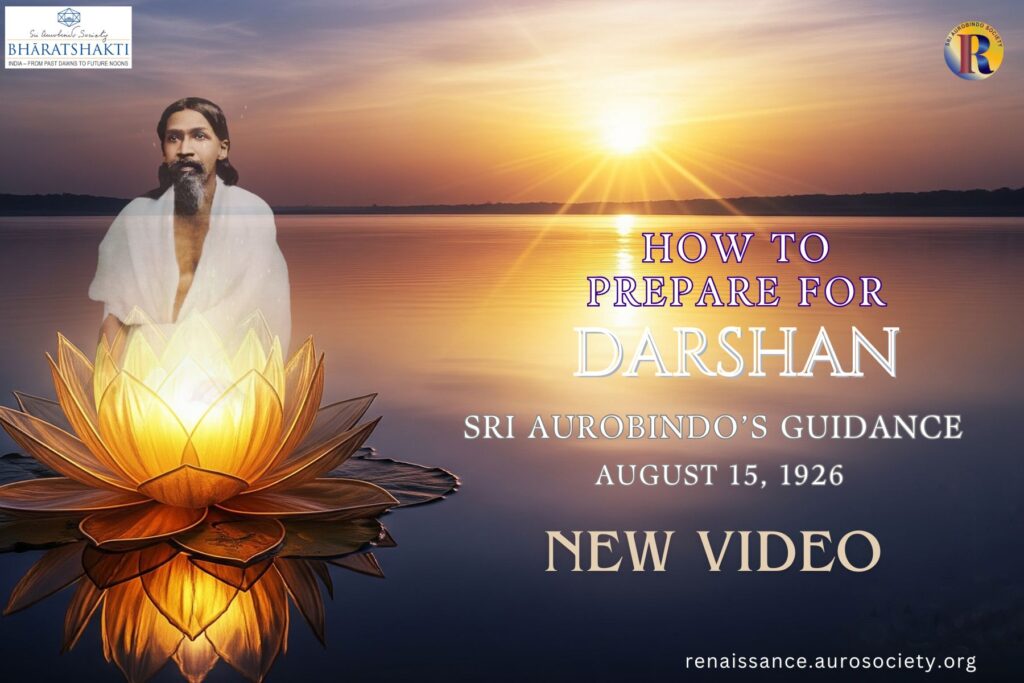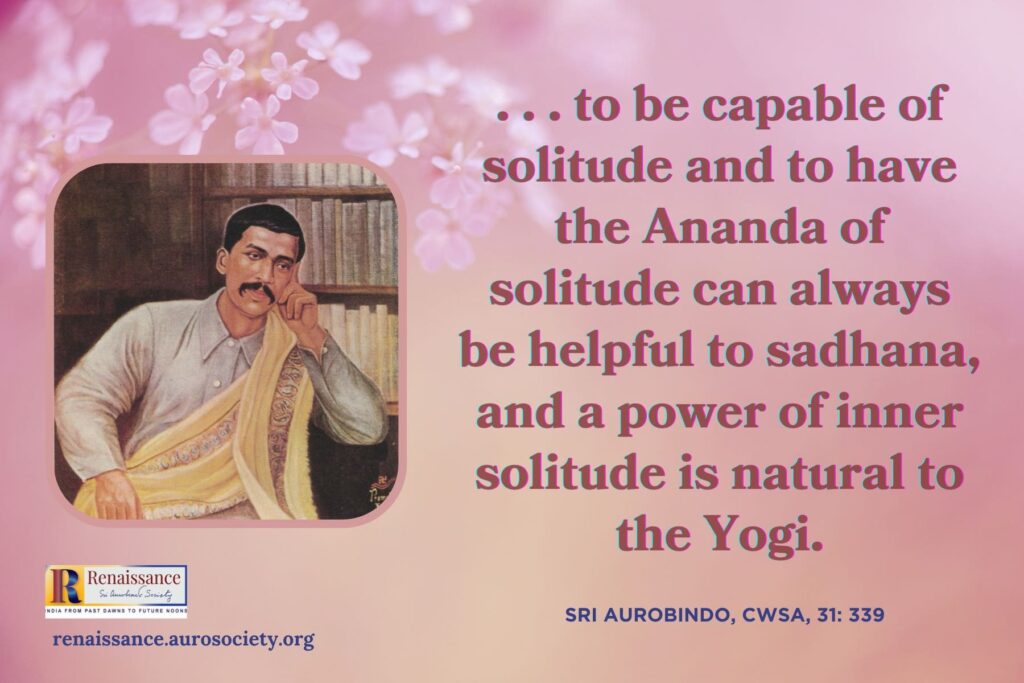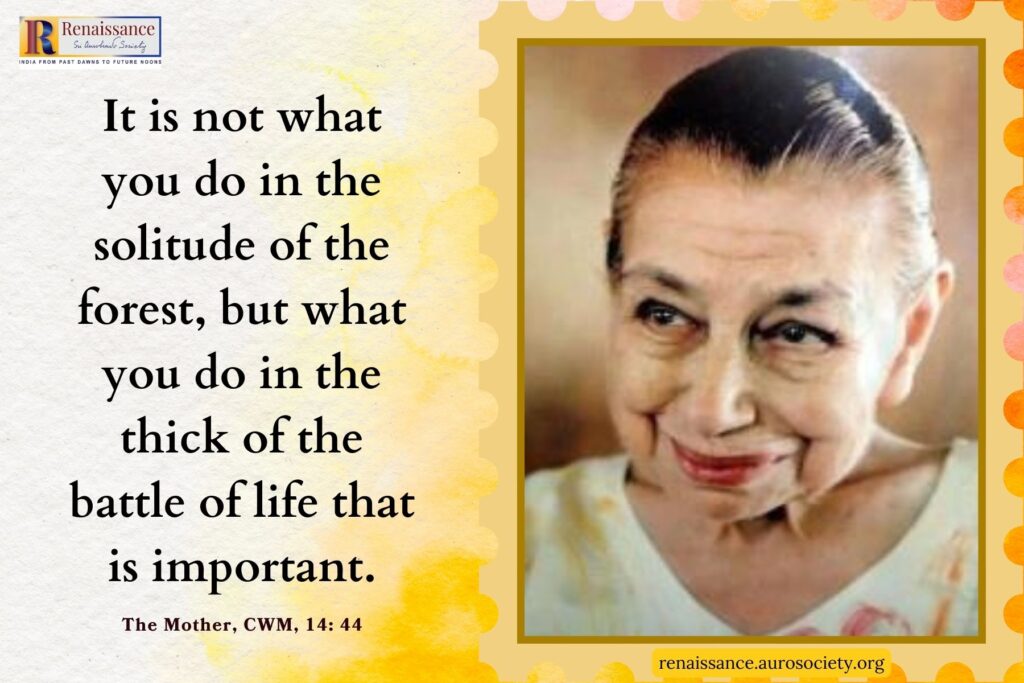Editor’s Note: The following selections from Sri Aurobindo and the Mother speak of the difference between meditation and concentration. Here we get great insights into not only the theoretical difference between the two but also on the significance of concentration for one’s spiritual growth.
***
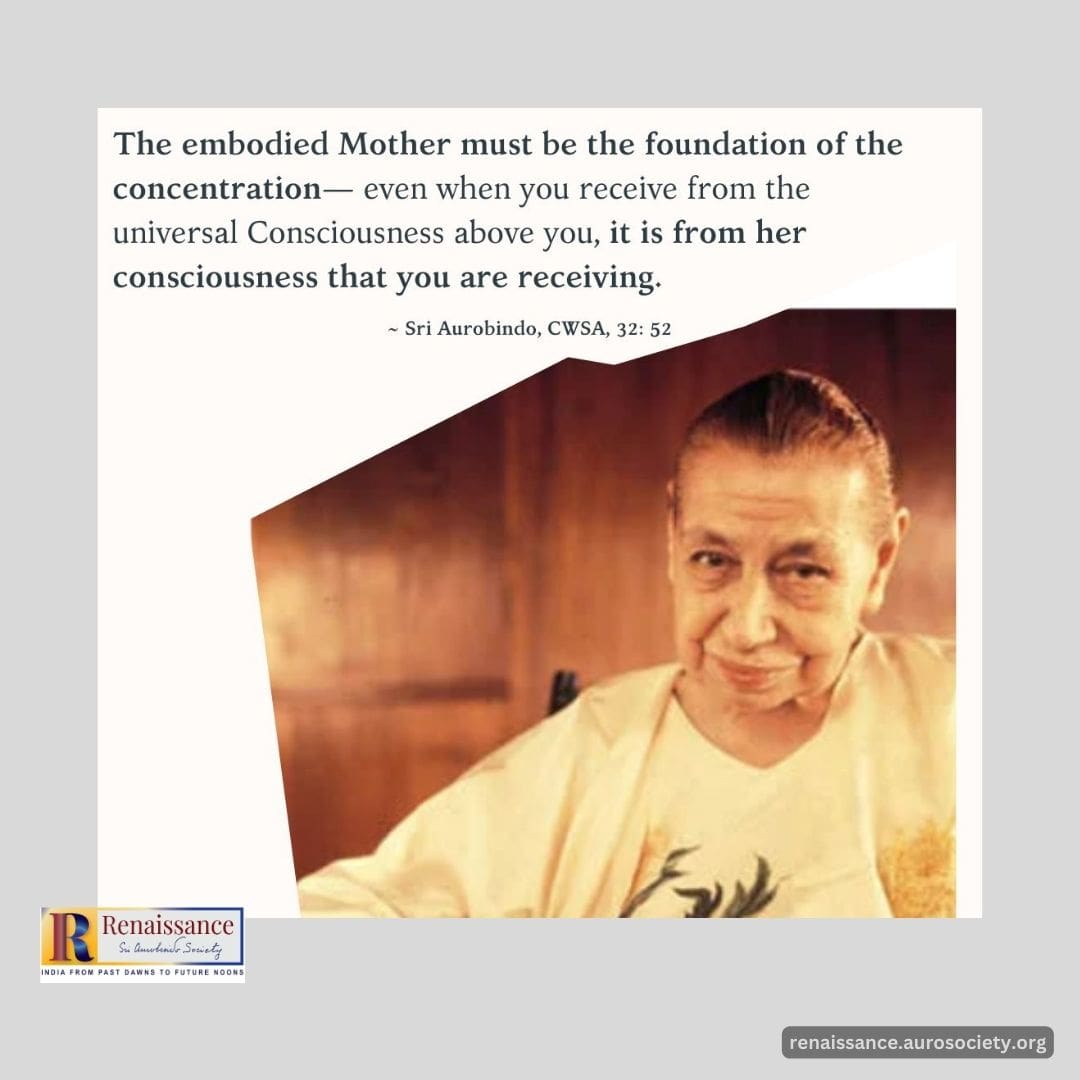
Sri Aurobindo’s Letters to Sadhaks
Concentration means fixing the consciousness in one place or on one object and in a single condition. Meditation can be diffusive, e.g. thinking about the Divine, receiving impressions and discriminating, watching what goes on in the nature and acting upon it etc.
***
Concentration is a gathering together of the consciousness and either centralising at one point or turning on a single object, e.g. the Divine—there can also be a gathered condition throughout the whole being, not at a point.
In meditation it is not indispensable to gather like this, one can simply remain with a quiet mind thinking of one subject or observing what comes in the consciousness and dealing with it.
***
Meditation means thinking on one subject in a concentrated way. In concentration proper there is not a series of thoughts, but the mind is silently fixed on one object, name, idea, place etc.
There are other kinds of concentration, e.g. concentrating the whole consciousness in one place, as between the eyebrows, in the heart, etc. One can also concentrate to get rid of thought altogether and remain in a complete silence.
~ Sri Aurobindo, CWSA, Vol. 29, p. 297
***
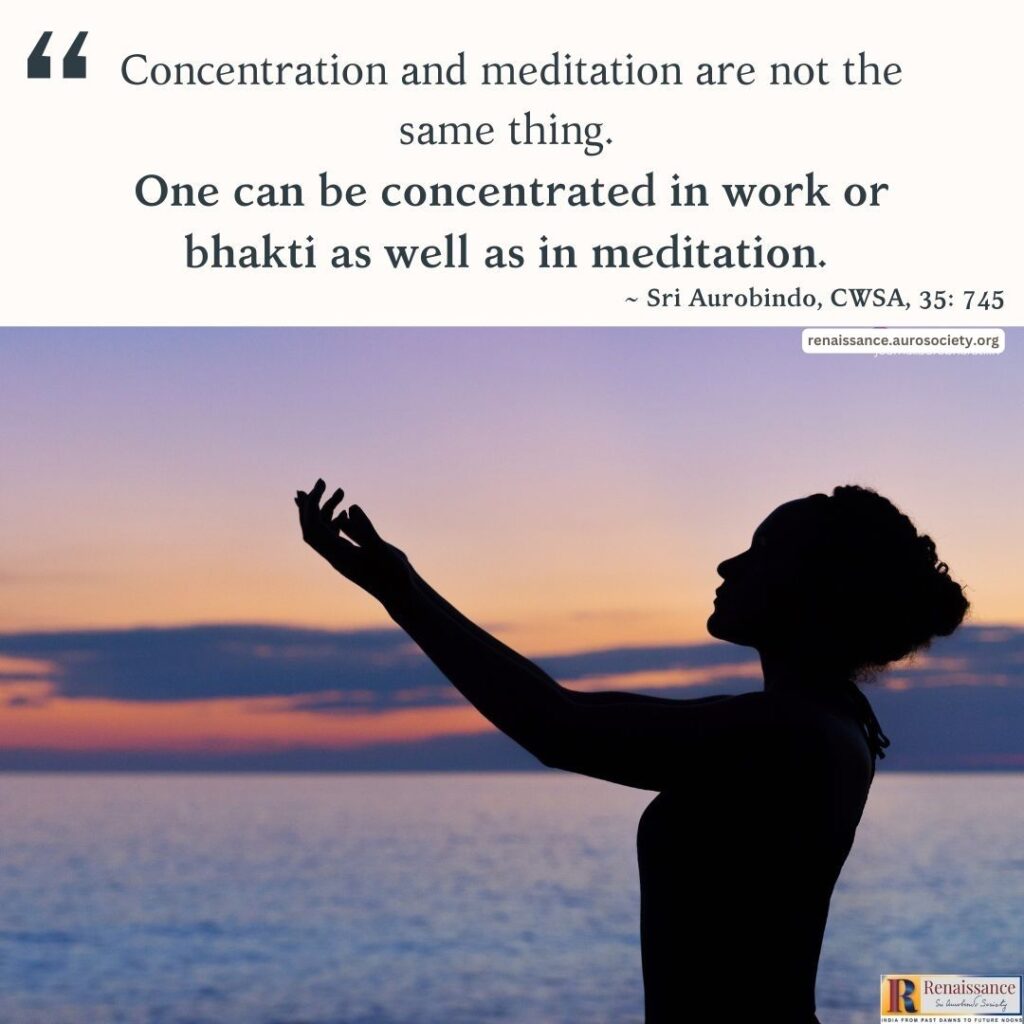
Sri Aurobindo on Centers of Concentration
One can concentrate in any of the three centres which is easiest to the sadhak or gives most result.
The power of the concentration in the heart-centre is to open that centre and by the power of aspiration, love, bhakti, surrender remove the veil which covers and conceals the soul and bring forward the soul or psychic being to govern the mind, life and body and turn and open them all—fully—to the Divine, removing all that is opposed to that turning and opening.
This is what is called in this Yoga the psychic transformation.
The power of concentration above the head is to bring peace, silence, liberation from the body sense, the identification with mind and life and open the way for the lower (mental-vital-physical) consciousness to rise up to meet the higher Consciousness above and for the powers of the higher (spiritual or divine) Consciousness to descend into mind, life and body.
This is what is called in this Yoga the spiritual transformation.
If one begins with this movement, then the Power from above has in its descent to open all the centres (including the lowest centre) and to bring out the psychic being; for until that is done there is likely to be much difficulty and struggle of the lower consciousness obstructing, mixing with or even refusing the Divine Action from above. If the psychic being is once active this struggle and these difficulties can be greatly minimised.
The power of concentration in the eyebrows is to open the centre there, liberate the inner mind and vision and the inner or Yogic consciousness and its experiences and powers. From here also one can open upwards and act also in the lower centres; but the danger of this process is that one may get shut up in one’s mental spiritual formations and not come out of them into the free and integral spiritual experience and knowledge and integral change of the being and nature.
***
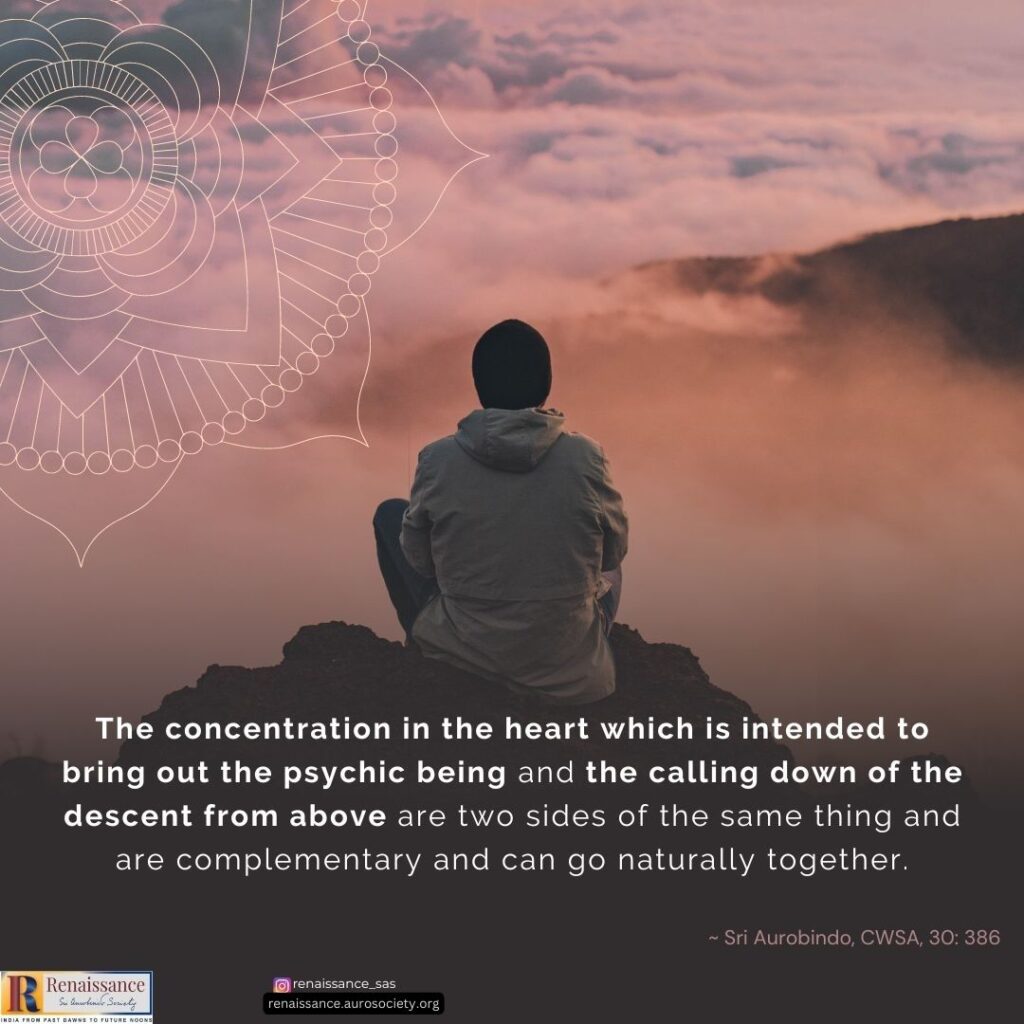
Posture for Concentrated Meditation
The sitting motionless posture is the natural posture for concentrated meditation—walking and standing are active conditions suited for the dispense of energy and the activity of the mind. It is only when one has gained the enduring rest and passivity of the consciousness that it is easy to concentrate and receive when walking or doing anything.
A fundamental passive condition of the consciousness gathered into itself is the proper poise for concentration and a seated gathered immobility in the body is the best for that. It can be done also lying down, but that position is too passive, tending to be inert rather than gathered. This is the reason why Yogis always sit in an asana. One can accustom oneself to meditate walking, standing, lying, but sitting is the first natural position.
***
Passive Meditation and Concentration
. . . passive meditation can bring a great peace and quiet and joy. The Light also may come and other spiritual experiences. But it leaves the vital and body passive and without defence against inertia, illness etc. instead of bringing it either a dynamic force or a strong self-contained peace. The consciousness instead of being concentrated gets widely diffused and loosely extended.
From the passivity [comes] the weakness and disinclination for the worldly duties; from the diffusion the play of activity in the mind which prevented sleep and could not be controlled in a tendency also for the subtle being to go out of the body in the waking condition instead of through sleep as it ordinarily does, whence the beating of the heart and the cold feet.
Concentration must in the earlier stages be active and dynamic with the consciousness gathered and capable of turning the will in any direction.
The concentration in this Yoga must be in the head or in the heart-centre, not in the centre at the base of the spinal cord—that can only come afterwards when all the other centres have been opened.
***
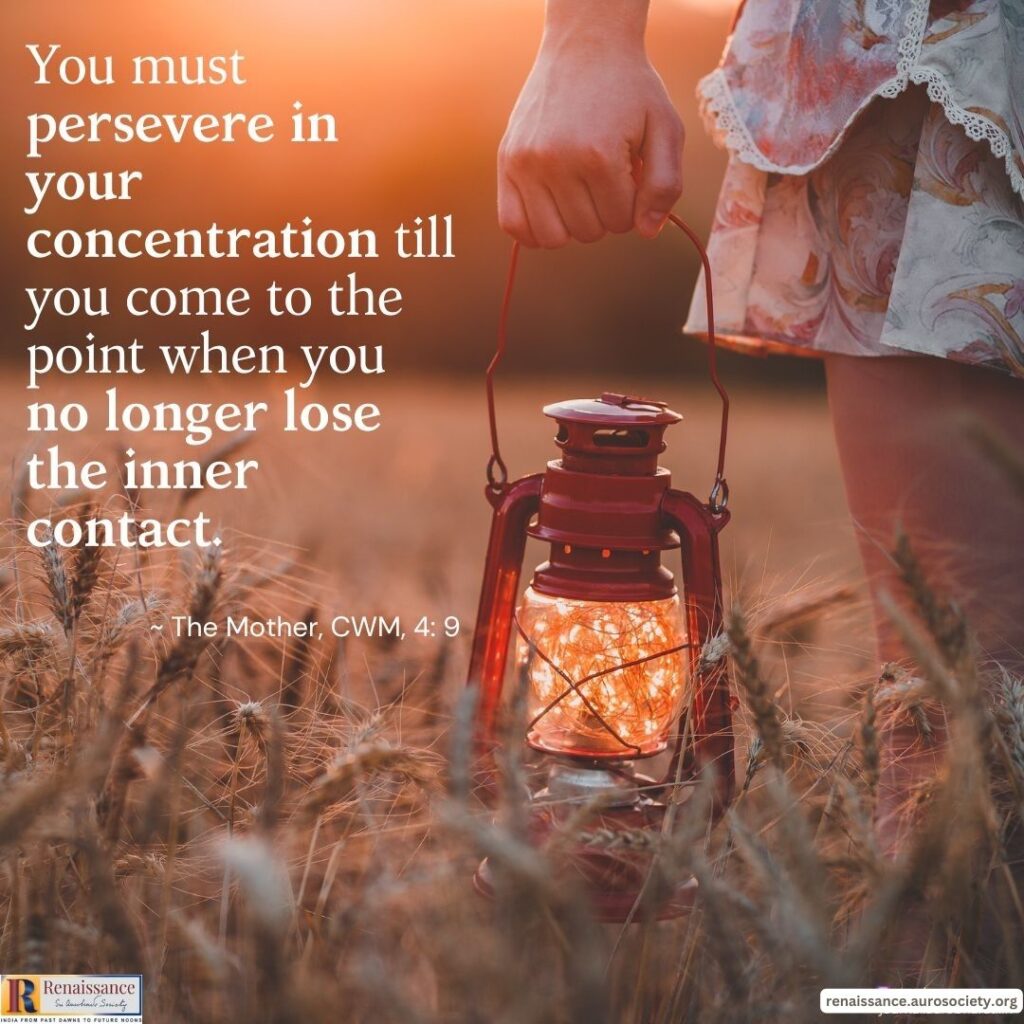
Steady Will is Important
It is not a fact that when there is obscurity or inertia, one cannot concentrate or meditate. If one has in the inner being the steady will to do it, it can be done.
***
Concentration is very helpful and necessary—the more one concentrates (of course in the limits of the body’s capacity without straining it), the more the force of the Yoga grows.
But you must be prepared for the meditation being sometimes not successful and not get upset by it—for that variability of the meditations happens to everybody. There are different causes for it.
But it is mostly something physical that interferes, either the need of the body to take time to assimilate what has come or been done or sometimes inertia or dullness due to causes such as those you mention or others. The best thing is to remain quiet and not get nervous or dejected—till the force acts again.
***
The Mother’s Explanation dated 25 December 1950
Meditation is a purely mental activity, it interests only the mental being. One can concentrate while meditating but this is a mental concentration; one can get a silence but it is a purely mental silence, and the other parts of the being are kept immobile and inactive so as not to disturb the meditation. You may pass twenty hours of the day in meditation and for the remaining four hours you will be an altogether ordinary man because only the mind has been occupied—the rest of the being, the vital and the physical, is kept under pressure so that it may not disturb.
In meditation nothing is directly done for the other parts of the being.
Certainly this indirect action can have an effect, but… I have known in my life people whose capacity for meditation was remarkable but who, when not in meditation, were quite ordinary men, even at times ill-natured people, who would become furious if their meditation was disturbed. For they had learnt to master only their mind, not the rest of their being.
Concentration is a more active state.
You may concentrate mentally, you may concentrate vitally, psychically, physically, and you may concentrate integrally. Concentration or the capacity to gather oneself at one point is more difficult than meditation. You may gather together one portion of your being or consciousness or you may gather together the whole of your consciousness or even fragments of it, that is, the concentration may be partial, total or integral, and in each case the result will be different.
If you have the capacity to concentrate, your meditation will be more interesting and easier. But one can meditate without concentrating. Many follow a chain of ideas in their meditation—it is meditation, not concentration.
***
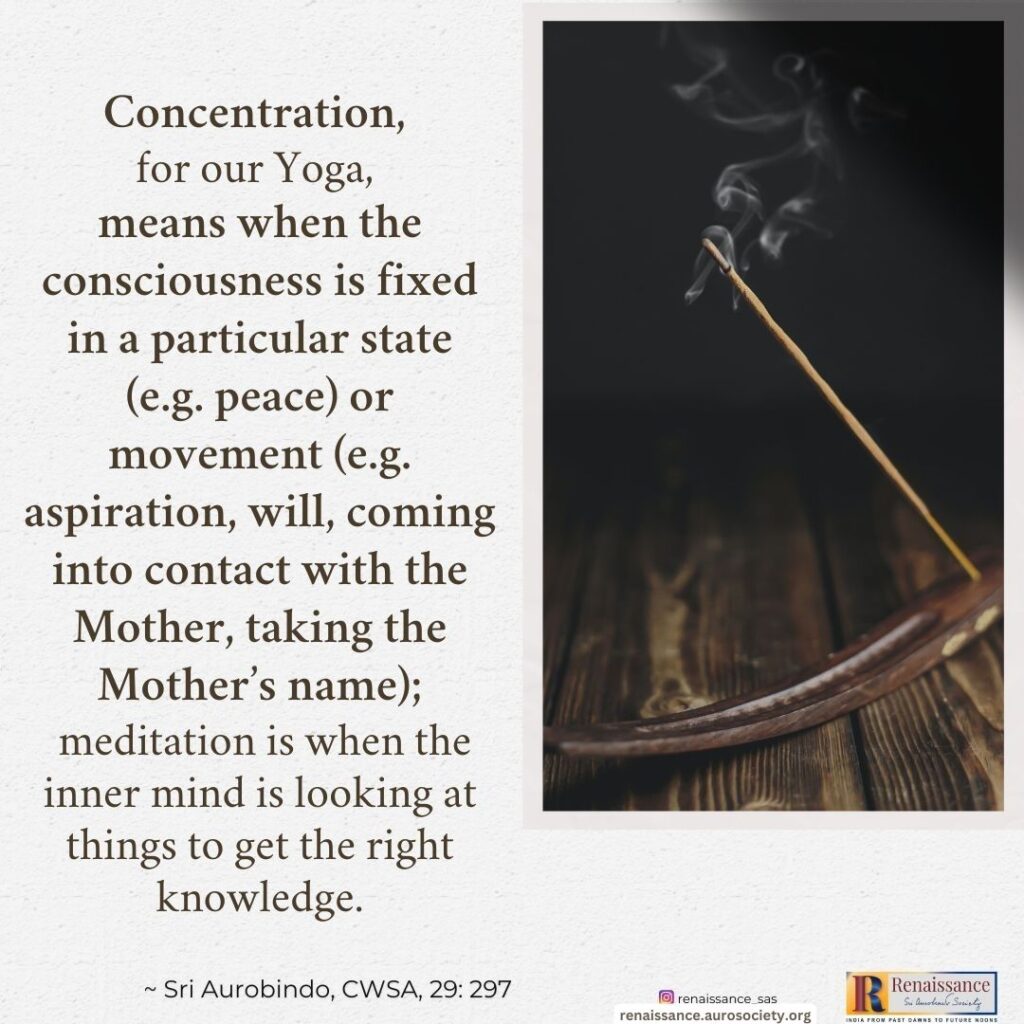
Disciple: Is it possible to distinguish the moment when one attains perfect concentration from the moment when, starting from this concentration, one opens oneself to the universal Energy?
Yes. You concentrate on something or simply you gather yourself together as much as is possible for you and when you attain a kind of perfection in concentration, if you can sustain this perfection for a sufficiently long time, then a door opens and you pass beyond the limit of your ordinary consciousness—you enter into a deeper and higher knowledge. Or you go within. Then you may experience a kind of dazzling light, an inner wonder, a beatitude, a complete knowledge, a total silence. There are, of course, many possibilities but the phenomenon is always the same.
To have this experience all depends upon your capacity to maintain your concentration sufficiently long at its highest point of perfection.
Disciple: To have this experience is it necessary to concentrate every time?
In the beginning, yes, for you have not the capacity to keep what you have acquired, to maintain your concentration at its maximum—you slip back and lose even the memory of the experience you have had.
But if you once follow a path, it is easier to follow the same path a second time and so on. The second concentration is therefore easier than the first one. You must persevere in your concentration till you come to the point when you no longer lose the inner contact.
From that time onward you must remain in this inner and higher consciousness from where you can do everything. You see your body and the material world and you know what is to be done and how to do it.
That is the first aim of concentration, but naturally not the last.
***
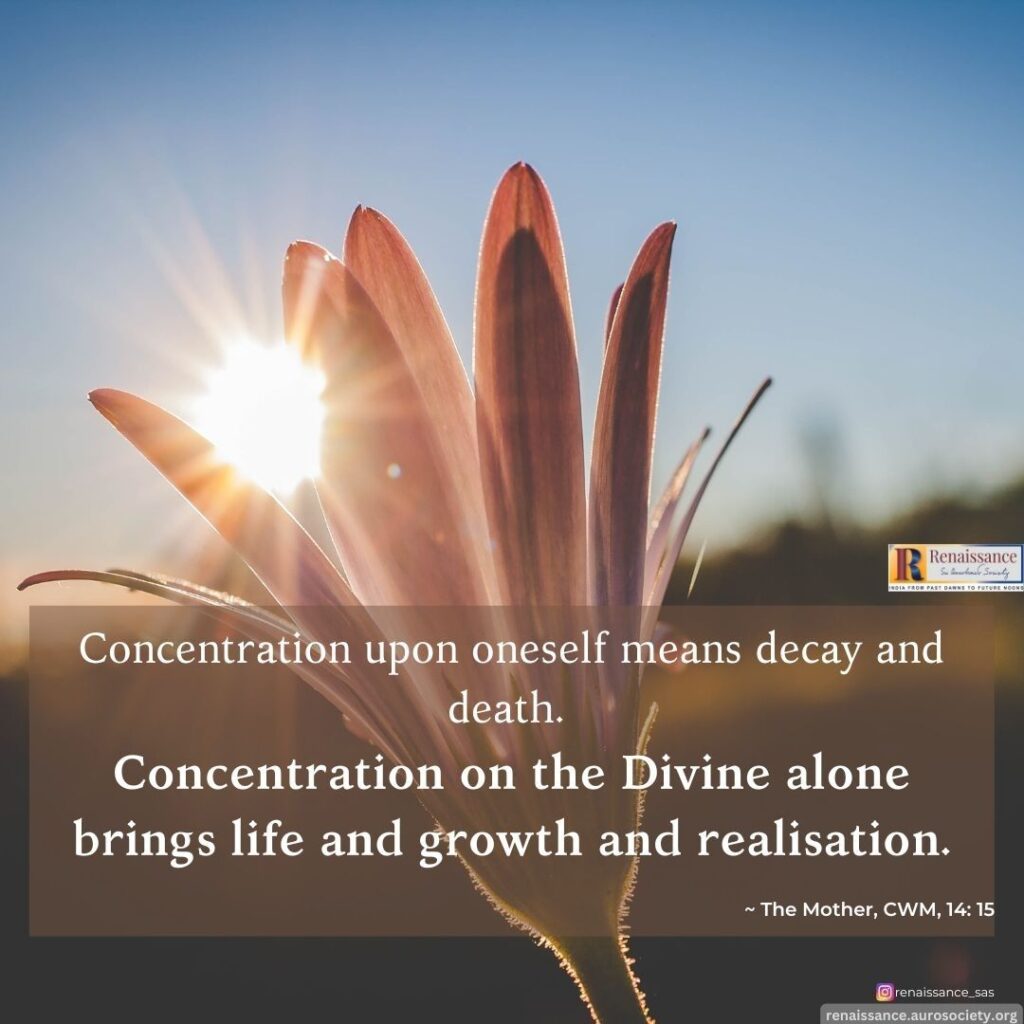
To attain that concentration much effort is necessary; an immediate or even a quick result is rarely possible. But if the inner door has once been opened, you may be sure that it will open again if you know how to persevere.
As long as the door has not been opened, you may doubt your capacity, but once opened, no more doubt is possible, if you go on willing and aspiring.
This experience has a considerable value.
Also read:
Sri Aurobindo’s Words on Concentration in Spiritual Life
~ Design: Vijayatha
Cover image: Beloo Mehra

